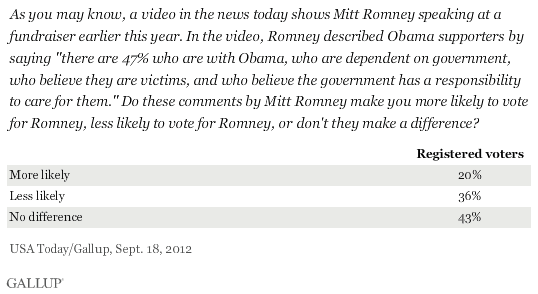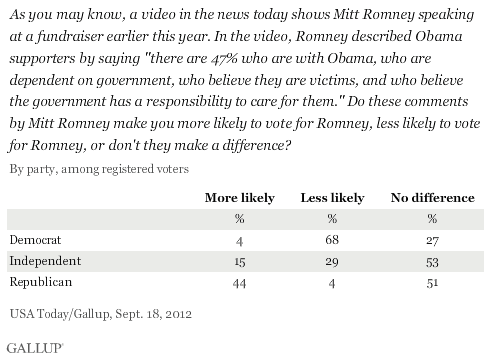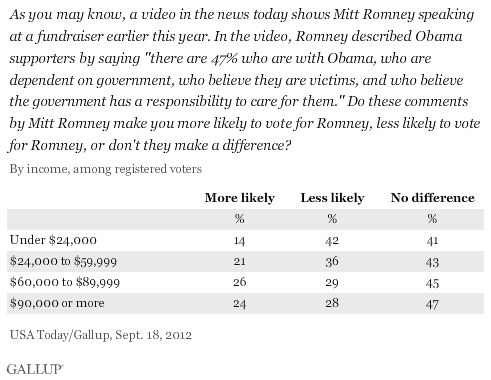PRINCETON, NJ -- Americans have a more negative than positive immediate reaction to Republican presidential nominee Mitt Romney's comments, secretly caught on video, about the 47% of Americans whom he said are Obama supporters and dependent on the government. Thirty-six percent of voters say Romney's comments make them less likely to vote for him, while 20% say the remarks make them more likely to vote for him, and 43% say the comments won't make a difference.

These results are from a one-night USA Today/Gallup poll conducted Sept. 18 among 885 registered voters. Respondents were read a direct quotation from Romney's comments (exact wording in the graph above) and asked to give their reaction.
A substantial majority of Americans have already made up their minds about their vote choice, so it is likely that many of those who claim to be "more likely" or "less likely" to vote for Romney are, in essence, indicating that the comments reinforced their pre-existing vote choice. This may be particularly true of Democrats, who have the strongest immediate reactions, with more than two-thirds saying the comments make them less likely to vote for Romney. Given that Gallup Daily tracking data show that only 5% of Democrats are voting for Romney anyway, it is unlikely that these sentiments from Democrats will significantly change the course of the election.
Similarly, since 92% of Republicans are voting for Romney, it is unlikely that the 44% of Republicans who say the comments make them more likely to vote for Romney will affect the race.
But independents -- voters who are, by definition, less fixed in their partisanship -- tilt toward the "less likely" over the "more likely" view by a 29% to 15% margin -- although more than half say Romney's comments make no difference.

There are also differences by income in response to Romney's comments. Those with annual household incomes of less than $24,000 are slightly more likely than average to say the comments make them less likely to vote for Romney (42%). Those making at least $90,000 a year are more evenly split, with 28% saying "less likely" and 24% "more likely."

Implications
The immediate impact of Romney's comments appears to be more negative than positive, which suggests that the comments could hurt Romney's ultimate chances of winning the election. Still, the long-term impact of any news event that flares up in the heat of a presidential campaign is difficult to determine. This is particularly true in today's more polarized news environment in which audiences of conservative-oriented vs. liberal-oriented media outlets are likely to hear quite different interpretations of the flap, and from different commentators. Regardless, both campaigns will clearly be heavily spinning the story in the days ahead.
Any longer-term impact of Romney's comments would eventually show up in Gallup Daily tracking of voter preferences for president, although there has been no evident change to date.
Track every angle of the presidential race on Gallup.com's Election 2012 page.
Survey Methods
Results of this USA Today/Gallup Poll are based on telephone interviews conducted as part of Gallup Daily tracking Sept. 18, 2012, with a random sample of 885 registered voters, aged 18 and older, living in all 50 U.S. states and the District of Columbia.
For results based on the total sample of registered voters, one can say with 95% confidence that the maximum margin of sampling error is ±4 percentage points.
Interviews are conducted with respondents on landline telephones and cellular phones, with interviews conducted in Spanish for respondents who are primarily Spanish-speaking. Each sample includes a minimum quota of 400 cell phone respondents and 600 landline respondents per 1,000 national adults, with additional minimum quotas among landline respondents by region. Landline telephone numbers are chosen at random among listed telephone numbers. Cell phone numbers are selected using random-digit-dial methods. Landline respondents are chosen at random within each household on the basis of which member had the most recent birthday.
Samples are weighted by gender, age, race, Hispanic ethnicity, education, region, adults in the household, and phone status (cell phone only/landline only/both, cell phone mostly, and having an unlisted landline number). Demographic weighting targets are based on the March 2011 Current Population Survey figures for the aged 18 and older non-institutionalized population living in U.S. telephone households. All reported margins of sampling error include the computed design effects for weighting and sample design.
In addition to sampling error, question wording and practical difficulties in conducting surveys can introduce error or bias into the findings of public opinion polls.
Polls conducted entirely in one day, such as this one, are subject to additional error or bias not found in polls conducted over several days.
View methodology, full question results, and trend data.
For more details on Gallup's polling methodology, visit www.gallup.com.
